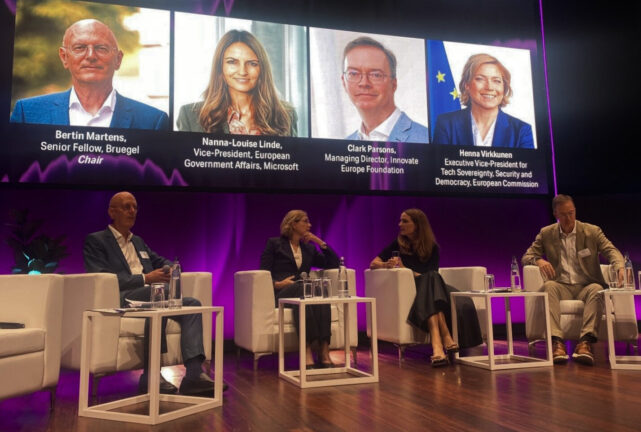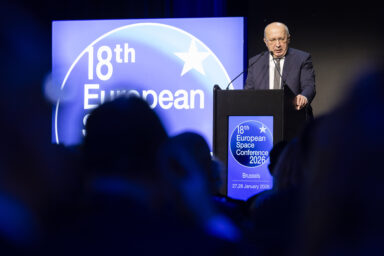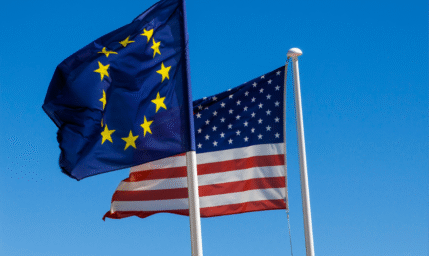Europe’s ambition to increase digital productivity collided this week with geopolitical tensions and internal disagreements over how far Brussels should go in regulating Big Tech. At Bruegel’s Annual Meetings, marking the think tank’s 20th anniversary, policymakers, industry executives, and startup advocates debated strategies to “Rekindling the EU’s digital productivity growth“. The Commission wants to make Europe the best place in the world to do research but critics say it has become a “technological colony”.
Facing a half-full room, the session was framed by former ENB head Mario Draghi’s warnings about Europe’s digital competition. “Draghi alarmed us last year that the EU was falling behind the US in terms of productivity growth, and he also pointed the main figure for that falling behind is the digital sector”, said Bertin Martens, Bruegel Senior Fellow, opening the debate.
Europe aims to become a global AI hub
Brussels is aiming to position the EU as a global leader in artificial intelligence. Henna Virkkunen, Commission’s Executive Vice-President for Tech Sovereignty, Security, and Democracy, laid out an expansive plan to make Europe an “AI continent.” It includes building up to five AI Giga Factories with €20bn in investment, launching a Data Union Strategy to ease access to data, and proposing a Cloud and AI Development Act to triple Europe’s data centre capacity within seven years.
“The priority of the Commission is to make Europe the best place in the world to do research, start innovative companies and also succeed in AI” – Henna Virkkunen, Commission Executive Vice-President
“The priority of the Commission is to make Europe the best place in the world to do research, start innovative companies and also succeed in AI”, Virkkunen told the audience. Europe, she argued, has the building blocks: 30 per cent more AI researchers per capita than the US, 7k AI startups, and world-class universities. The challenge is ensuring access to infrastructure and capital while cutting red tape.
Microsoft: unclear rules deter investment
Despite the infrastructure plans, companies warn that complex regulation remains a major barrier. Nanna-Louise Linde, Vice-President for European Government Affairs at Microsoft, said that infrastructure is not the bottleneck. “Microsoft has invested almost €20bn in Europe and we’ve committed to raising our capacity by 40 per cent over the coming years. There is no lack of infrastructure”, she added.
Too complicated, unclear regulation makes it less likely that companies will make these very expensive investments – Nanna-Louise Linde, Vice-President for European Government Affairs at Microsoft
Instead, Ms Linde pointed to Europe’s complex regulatory environment. “Too complicated, unclear regulation makes it less likely that companies will make these very expensive investments”, she argued. At the same time, she urged Brussels should avoid framing the debate as a zero-sum game. “We need each other. There are plenty of European companies, SAP, for example, they work with Microsoft, and that is part of their success story”.
Startups are scaling abroad
Scaling remains the greatest challenge for European startups. Clark Parsons, Managing Director of Innovate Europe Foundation, said Europe produces €3.5tn in startup value, but most growth happens in the US. He cited Klarna, a Swedish fintech company, which this week went public in New York to raise investment.
Parsons described Europe as “the greatest charity in the world” for tech founders, “training incredible founders, researchers and scientists, and then we let American companies harvest them”. His proposed solution: a “28th regime,” a single legal framework for startups across the EU, and better mobilisation of Europe’s savings, for example, through pension funds, to close the €30bn annual financing gap.
Google adtech fine
The session was overshadowed by reports that EU Trade Commissioner Maroš Šefčovič intervened at the last minute to block a fine against Google in the Commission’s long-running ad tech investigation. The decision came after US President Donald Trump threatened additional tariffs on countries with “discriminatory” digital rules.
When asked, Henna Virkkunen defended the Commission’s approach but avoided confirming whether trade politics had influenced the decision. “We will fully enforce and implement our legislation,” she said. “There are several investigations ongoing against these big online platforms, and investigations always take time. Anyone doing business in the European Union has to respect the same fair rules. European, US, Chinese companies. Everybody”.
You might be interested
Sovereignty ≠ competitiveness
The discussion repeatedly returned to the duality between Europe’s desire for sovereignty and the need to remain competitive. Martens pressed the point and asked that if Europe insisted on building its own stack, wouldn’t it drive up costs and limit choice?
For the commissioner, sovereignty means “we can choose with whom and how we are cooperating, so we are not dependent on one country or one company when it comes to some very critical sectors or services,” she said. Parsons was more blunt: “We’ve become a technological colony of the US. We send about €264bn per year across the Atlantic to US companies for cloud and IT services”.
Europe’s challenges
The discussion showed how Europe’s digital ambitions face multiple hurdles, from fragmented markets to unclear regulation and global scrutiny. While Startups struggle to grow without investment, Brussels pushes to build sovereignty through AI, cloud, and semiconductor capacity.











